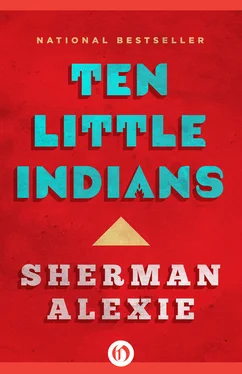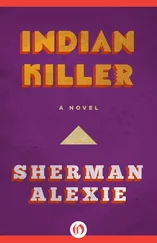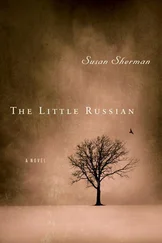The young woman spoke with much more confidence and power than she had before. How many people must underestimate her, Frank thought, and get their heads torn off.
“Hello, Mr. Frank Snake Church,” the Indian woman said, “I’m Stephanie. Why don’t you have a seat and we’ll set you up.”
“I told you she was great,” Lynn said. She led him by the hand to a wooden chair across the desk from Stephanie. Lynn sat him down and kissed him on the cheek. She came from a place, from a town and street, from a block and house, where all of the men had quit, had surrendered, had simply stopped and lay down in the street to die before they were fifteen years old. And here was an old man, a frightened man the same age as her father, and he was beautiful like Jesus, and scared like Jesus, and rising from the dead like Jesus. She kissed him because she wanted to pray with him and for him, but she didn’t know if he would accept her prayers, if he even believed in prayers. She kissed him, and Frank wanted to cry because this young woman, this stranger, had been so kind and generous. He knew he would never have another conversation with Lynn apart from hurried greetings and smiles and quick hugs and exclamations. She would soon graduate and transfer to a four-year university, taking her private hopes and dreams to a private college. After that, he would never see her again but would always remember her, would always associate the smell of chalk and new books and floor polish and sea-salt air with her memory. She kissed him on the cheek, touched his shoulder, and hurried out the door, back to the work that was paying for school that was saving her life.
“So, Mr. Snake Church,” Stephanie said. “What tribe are you?”
“I’m Spokane,” he said, his voice cracking.
“Are you okay?” she asked.
“Yes,” he said. But he wasn’t. He covered his face and cried.
She came around the table and knelt beside him.
“Frank,” she said. “It’s okay, it’s okay. I’m here, I’m here.”
With Stephanie’s help, Frank enrolled in Math 99, English 99, History 99, Introduction to Computer Science, and Physical Education.
His first test was in math.
The first question was a story problem: “Bobby has forty dollars when he walks into the supermarket. If Bobby buys three loaves of bread for ten dollars each, and he buys a bottle of orange juice for three dollars, how much money will he have left?”
Frank didn’t have to work the problem on paper. He did the math in his head. Bobby would have seven bucks left, but he’d paid too much for the bread and not enough for the juice. Easy cheese, Frank thought, confident he could do this.
With one question answered, Frank moved ahead to the others.
Three weeks into his first quarter, Frank walked across campus to the athletic center and knocked on the basketball coach’s door.
“Come in,” the coach said.
Frank stepped inside and sat across the desk from the coach, a big white man with curly blond hair. He was maybe Frank’s age or a little older.
“How can I help you?” the coach asked.
“I want to play on your basketball team.”
The coach smiled and leaned toward Frank. “How old are you?” he asked.
“Forty-one,” Frank said.
“Do you have any athletic eligibility left?”
“This is my first time in college. So that means I have all my eligibility, right?”
“That’s right.”
“I thought so. I looked it up.”
“I bet you did. Not a whole lot of forty-one-year-old guys are curious about their athletic eligibility.”
“How old are you?” Frank asked.
“Forty-three. But my eligibility is all used up.”
“I know, you played college ball at the University of Washington. And high school ball at Roosevelt.”
“Did you look that up, too?”
“No, I remember you. I played against you in high school. And I was supposed to play with you at UW.”
The coach studied Frank’s face for a while, and then he remembered. “Snake Church,” he said.
“Yes,” Frank said, feeling honored.
“You were good. No, you were great. What happened to you?”
“That doesn’t matter. My history isn’t important. I’m here now, and I want to play ball for you.”
“You don’t look much like a ballplayer anymore.”
“I’ve gained a lot of weight in the last year. I’ve been in residential treatment for some mental problems.”
“You don’t have to tell me this.”
“No, I need to be honest. I need to tell you these things. Before I got sick, I was in the best shape of my life. I can get there again.”
The coach stood. “Come on,” he said. “I want to show you something.”
He led Frank out of the office and to the balcony overlooking the basketball court. The community-college team ran an informal scrimmage. Ten young and powerful black men ran the court with grace and poetry. It was beautiful. Frank wanted to be a part of it.
“Hey!” the coach yelled down to his players. “Run a dunk drill!”
Laughing and joking, the black men formed two lines and ran the drill. All of them could easily dunk two-handed, including the five-foot-five point guard.
“That’s pretty good, right?” the coach asked.
“Yes,” Frank said.
“All right!” the coach yelled down to his players. “Now run the real dunk drill!”
Serious now, all of the young men ripped off reverse dunks, 360-degree dunks, alley-oops, bounce-off-the-floor-and-off-the-backboard dunks, and one big guy dunked two balls at the same time.
“I’ve built myself a great program here,” the coach said. “I’ve had forty players go Division One in the last ten years. All ten guys down there have Division One talent. It’s the best team I’ve ever had.”
“They look great,” Frank said.
“Do you really think you can compete with them? Twenty years ago, maybe. But now? I’m happy you’re here, Frank, I’m proud of you for coming back to college, but I think you’re dreaming about basketball.”
“Let me down there,” Frank said. “And I’ll show you something.”
The coach thought it over. What did he have to lose? If basketball was truly a religion, as he believed, then he needed to practice charity in order to be a truly spiritual man.
“All right,” the coach said. “Let’s see how much gas you have left in the tank.”
Frank and the coach walked down to the court and greeted the players.
“Okay, men,” the coach said. “I’ve got a special guest today.”
“Hey, Coach, is that your chiropractor?” the big guy asked.
They laughed.
“No, this is Frank Snake Church. He’s going to run a little bit with you guys.”
Wearing black jeans, a black T-shirt, and white basketball shoes, Frank looked like a coffee-shop waiter.
“Hey, Coach, is he going to run in his street clothes?”
“He can talk,” Coach said. “Ask him.”
“Yo, old-timer,” said the point guard. “Is this one of those Make-A-Wish things? Are we your dying request?”
They laughed.
“Yes,” Frank said.
They stopped laughing.
“Shit, man,” the point guard said. “I’m sorry. I didn’t mean no harm. What you got, the cancer?”
“No, I’m not dying. It’s for my father and mother. They’re dead, and I’m trying to remember them.”
Uncomfortable, the players shuffled their feet and looked to their coach for guidance.
“Frank, are you okay?” asked the coach, wishing he hadn’t let this nostalgic stunt go so far.
“I want to be honest with all of you,” Frank said. “I’m a little crazy. Basketball has made me a little crazy. And that’s probably a little scary to you guys. I know you all grew up with tons of crazy, and you’re playing ball to get away from it. But I don’t mean to harm anybody. I’m a good man, I think, and I want to be a better man. The thing is, I don’t think I was a good son when my mother and father were alive, so I want to be a good son now that they’re dead. I think I can do that by playing ball with you guys. By playing on this team.”
Читать дальше












